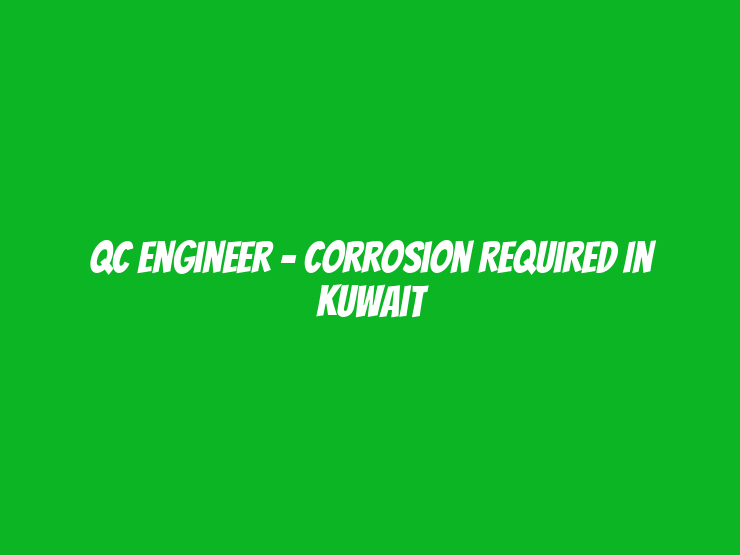A QC (Quality Control) Engineer specializing in corrosion is responsible for ensuring the integrity, durability, and safety of materials and structures by preventing, detecting, and mitigating corrosion. This role is critical in industries such as oil and gas, petrochemicals, marine, and infrastructure, where corrosion poses significant risks. The QC Engineer oversees testing, inspection, and implementation of protective measures to maintain compliance with industry standards and prolong the lifespan of assets.
Dua for Job Seeking: اللهم يسر ولا تعسر واكمل ولا تكل وبارك لي فيما قَدَّرت
| Salary | Market Competitive |
| Experience | 6 – 11 years |
| Location | Kuwait |
| Qualification | Bachelor of Technology/Engineering |
| Posted | 22 November 2024 |
| Job Type | Full-Time |
| Posted by | Habeebi Recruiter |
| last date to apply | apply within 15 days |
Key Responsibilities
Inspection and Testing
The QC Engineer conducts regular inspections and testing of materials, coatings, and structures to identify signs of corrosion or degradation. They utilize techniques such as visual inspections, ultrasonic testing, and non-destructive testing (NDT) to assess the condition of assets. These evaluations are essential for detecting early signs of wear and ensuring preventive action is taken.
Corrosion Analysis and Reporting
This role involves analyzing corrosion data to determine root causes and recommend corrective measures. The QC Engineer prepares detailed reports summarizing findings, including the extent and type of corrosion, contributing factors, and potential impacts on the structure’s integrity. These reports are crucial for decision-making and risk management.
Implementation of Protective Measures
The QC Engineer oversees the application of protective coatings, cathodic protection systems, and other anti-corrosion technologies. They ensure these measures are properly implemented according to design specifications and industry standards to minimize the risk of corrosion.
Compliance with Standards and Regulations
Ensuring compliance with national and international standards (e.g., NACE, ISO, ASTM) is a critical aspect of the role. The QC Engineer ensures that all procedures, materials, and protective measures meet regulatory requirements and best practices in corrosion management.
Material Selection and Compatibility
The QC Engineer evaluates and recommends appropriate materials and coatings for use in corrosive environments. They assess material compatibility with operational conditions, such as temperature, humidity, and chemical exposure, to optimize performance and longevity.
Failure Investigation
In cases of material or structural failure, the QC Engineer conducts investigations to identify whether corrosion was a contributing factor. They collaborate with other engineers to determine the root cause and propose solutions to prevent recurrence.
Documentation and Record Keeping
The QC Engineer maintains accurate records of inspections, tests, and maintenance activities. These records are essential for audits, quality control reviews, and tracking the effectiveness of corrosion mitigation efforts.
Collaboration and Training
Working closely with other departments, contractors, and vendors, the QC Engineer provides technical guidance and training to ensure that corrosion prevention measures are understood and implemented correctly. They may also conduct workshops or seminars to educate teams on corrosion control practices.
Skills and Qualifications
To excel as a QC Engineer specializing in corrosion, candidates typically require the following:
- Educational Background: A degree in materials engineering, metallurgy, chemical engineering, or a related field. Certifications such as NACE (National Association of Corrosion Engineers) or API (American Petroleum Institute) are highly desirable.
- Technical Expertise: In-depth knowledge of corrosion mechanisms, protective coatings, cathodic protection, and NDT techniques.
- Analytical Skills: Ability to interpret data, identify patterns, and recommend effective solutions.
- Attention to Detail: Precision in inspections, testing, and reporting.
- Regulatory Knowledge: Familiarity with industry standards and compliance requirements.
- Communication Skills: Strong ability to document findings and collaborate with teams across functions.
Impact and Importance
The role of a QC Engineer specializing in corrosion is essential for maintaining the safety, reliability, and cost-effectiveness of critical infrastructure and industrial assets. By preventing and managing corrosion, they protect the environment, reduce maintenance costs, and ensure operational efficiency. Their expertise contributes to the long-term sustainability and safety of assets in challenging environments.
How to apply:
Send your updated resume to our email or directly reach us at our phone:
Email: ajay@recruiters-zone.com, recruitment@recruiters-zone.com
Phone: +91 9571952222
Disclaimer:
- We list jobs submitted by employers. HabeebiRecruiter.com does not verify employers or guarantee job details.
- Be aware: legitimate jobs never require upfront payment
